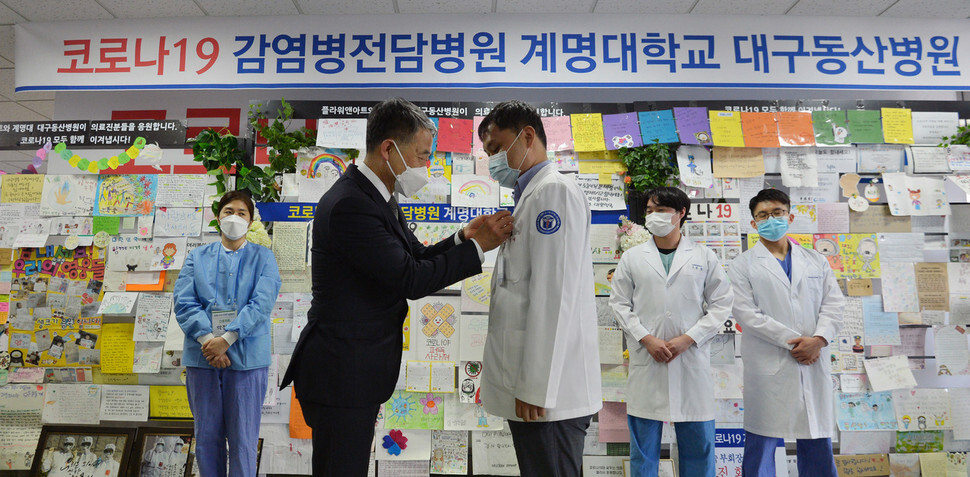hankyoreh
Links to other country sites 다른 나라 사이트 링크
S. Korea to convert infectious disease beds to regular hospital beds as COVID-19 cases decrease

As the decline in newly diagnosed novel coronavirus cases has resulted in a number of dedicated infectious disease hospital beds being unoccupied, the South Korean government plans to adopt a step-by-step approach to convert a portion of them to ordinary beds. The plan will create more availability for usage by non-coronavirus patients at the national and public hospitals that make up the backbone of medical services in South Korea’s different regions. In consideration of the possibility of another COVID-19 outbreak, the government is in discussions with the different city and provincial governments on plans to quickly converting ordinary hospital beds to infectious disease beds in the event of a crisis.
On Apr. 23, the Central Disaster and Safety Countermeasures Headquarters (CDSCHQ) announced that it would be implementing a four-stage reduction of 7,535 beds at 67 dedicated infectious disease hospitals. A total of 682 infectious disease beds at 12 hospitals with no confirmed coronavirus patients were converted to regular beds as of that day, with additional conversions planned within the month for 11 nursing hospitals and other hospitals deemed inappropriate for a sustained infectious disease response or having an infectious disease bed usage rate of 5% or lower. In early May, reductions are to take place at 12 metropolitan cities and provinces other than Daegu, North Gyeongsang Province, and the Seoul Capital Area, where the timeline for reductions are to be determined after observing future diagnosis trends. National and public hospitals represent 55 of the 67 current dedicated infectious disease hospitals.
The reason for the conversion to ordinary hospital bed status is the rate of unoccupied infectious disease beds, which stands at over 80%. As of Apr. 22, there were a total of 1,406 beds where patients were undergoing treatment in isolation. In Daegu and North Gyeongsang Province -- which have experienced the largest numbers of cases -- 1,996 out of 2,675 beds, or 74.6%, are now unoccupied, including those acquired through the cooperation of private hospitals. If the number of new diagnoses per day remains under 50 and the fourth stage of reductions is reached, the number of infectious disease beds nationwide will fall to the range of 1,500-2,300, the government said.
At the same time, the government announced that it would be acquiring additional medical resources to prepare for the possibility of another rapid increase in patients, including nationally designated negative pressure wards and ECMO (extracorporeal membrane oxygenation) equipment.
“We’re preparing for a second outbreak this fall or winter,” explained Yoon Tae-ho, director of the Central Accident Investigation Headquarters’ general disease prevention team.
“In addition to available sickbeds in individual cities and provinces, we’re also preparing for joint usage in regions across city and province boundaries,” he added.
Disease control authorities to conduct herd immunity survey
Disease control authorities also announced plans to conduct a “herd immunity” survey in Daegu and North Gyeongsang Province. “Herd immunity” refers to a state in which a certain proportion of members in a population possess antibodies that can neutralize a virus.
“By looking at the establishment of antibodies with definite defensive capabilities and preservation periods, we can predict whether future coronavirus outbreaks will occur,” explained KCDC Deputy Director Kwon Jun-wook. One of the specific plans under consideration involves acquiring blood samples from the Daegu/North Gyeongsang region and military recruits to test for antibodies when performing the annual national health and nutrition survey. A previous study conducted in the Netherlands, where around 30,000 people have been diagnosed out of a population of 17 million, found antibodies in only around 3% of the 7,000 blood donors whose samples were analyzed.
The KCDC reported six new cases for Apr. 24, bringing the cumulative total to 10,708.
By Choi Ha-yan and Kwon Ji-dam, staff reporters
Please direct comments or questions to [english@hani.co.kr]

Editorial・opinion
![[Editorial] Penalties for airing allegations against Korea’s first lady endanger free press [Editorial] Penalties for airing allegations against Korea’s first lady endanger free press](https://flexible.img.hani.co.kr/flexible/normal/500/300/imgdb/original/2024/0502/1817146398095106.jpg) [Editorial] Penalties for airing allegations against Korea’s first lady endanger free press
[Editorial] Penalties for airing allegations against Korea’s first lady endanger free press![[Editorial] Yoon must halt procurement of SM-3 interceptor missiles [Editorial] Yoon must halt procurement of SM-3 interceptor missiles](https://flexible.img.hani.co.kr/flexible/normal/500/300/imgdb/child/2024/0501/17145495551605_1717145495195344.jpg) [Editorial] Yoon must halt procurement of SM-3 interceptor missiles
[Editorial] Yoon must halt procurement of SM-3 interceptor missiles- [Guest essay] Maybe Korea’s rapid population decline is an opportunity, not a crisis
- [Column] Can Yoon steer diplomacy with Russia, China back on track?
- [Column] Season 2 of special prosecutor probe may be coming to Korea soon
- [Column] Park Geun-hye déjà vu in Yoon Suk-yeol
- [Editorial] New weight of N. Korea’s nuclear threats makes dialogue all the more urgent
- [Guest essay] The real reason Korea’s new right wants to dub Rhee a founding father
- [Column] ‘Choson’: Is it time we start referring to N. Korea in its own terms?
- [Editorial] Japan’s rewriting of history with Korea has gone too far
Most viewed articles
- 160% of young Koreans see no need to have kids after marriage
- 2Months and months of overdue wages are pushing migrant workers in Korea into debt
- 3[Editorial] Penalties for airing allegations against Korea’s first lady endanger free press
- 4Presidential office warns of veto in response to opposition passing special counsel probe act
- 5Hybe-Ador dispute shines light on pervasive issues behind K-pop’s tidy facade
- 6S. Korea “monitoring developments” after report of secret Chinese police station in Seoul
- 7[Reporter’s notebook] In Min’s world, she’s the artist — and NewJeans is her art
- 8[Exclusive] Hanshin University deported 22 Uzbeks in manner that felt like abduction, students say
- 9All eyes on Xiaomi after it pulls off EV that Apple couldn’t
- 10OECD upgrades Korea’s growth forecast from 2.2% to 2.6%